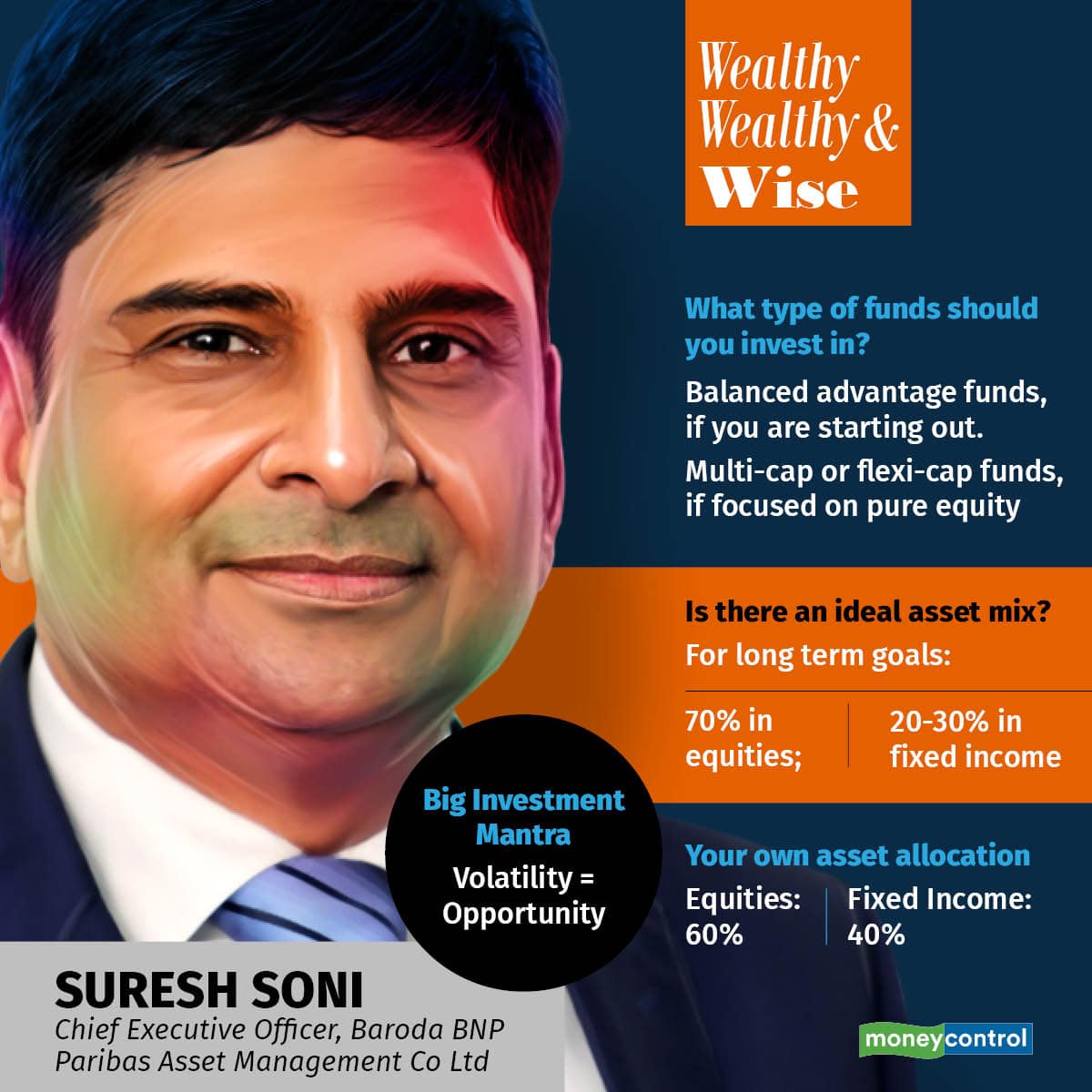



Suresh Soni may be the chief executive officer of one of India’s mid-sized fund houses, Baroda BNP Paribas Asset Management Co Ltd (with assets worth Rs 21,163.59 crore) but he is a veteran of the Indian mutual funds industry. In one of his first assignments, he was a debt fund manager in Pioneer ITI Asset Management Co Ltd’s highly successive fixed income team. Franklin Templeton Asset Management (India) Ltd acquired Kothari Pioneer AMC in 2002, after which Soni joined Deutsche Asset Management Co Ltd where he was first the head of its fixed income and later the fund house itself. He spent close to 14 years there, before he moved to PGIM Asset Management Co Ltd (erstwhile DHFL Pramerica AMC) as its chief executive when PGIM acquired Deutsche in 2016.
Soni has seen many market cycles over the last 20 years and knows just as well that markets go up and down. In a conversation with Moneycontrol, he tells us where investors should invest their Rs 10 lakh today.
Where should we start our investment journey, today?
Don’t read newspaper headlines and then decide if you should buy equities today, or sell equities tomorrow. That is not the right way.
Ask yourself: how long are you willing to stay invested. And how much of a risk you can take. That's when your investment journey begins.
If you have emergency needs coming up in the next six months, avoid equities, absolutely.
But if you’ve got goals, which are a few years away, only then look at equities. If you are at an early stage of your career and goals some few years away, you have time on your side. Look at equities.
Should you just invest in equities? Tell us an ideal asset mix for someone who is just starting the investment journey. Or is at an early stage of career.
Stick to the broad two asset classes to begin with: Equity and Fixed Income.
If you have time on your side, that is, your goals are still a few years away, invest more in equities. An idea mix would be 70 percent in equities and 20-30 percent in debt instruments.
What should be your first mutual fund scheme at this point in time? Should you invest in mid- and small-cap funds?
It’s daunting to look at 37 mutual fund categories and over 2,000 mutual fund schemes. Where should you start?
If you are looking for that one fund at the start of your investment journey, then a balanced advantage fund is good for you. This fund allocates your money between equity and fixed income, giving you a reasonably balanced exposure. And it keeps changing this asset allocation, automatically, depending on your asset allocation.
If you want a pure equity fund, go with a flexi-cap fund or a multi-cap fund. These schemes allocate your money between large-cap, mid-cap, and small-cap stocks, depending on the market conditions and where your fund manager sees opportunities.

Should you invest in new-age companies? Many such companies came out with initial public offers over the last one year.
Every time you hear a newly-listed company say the words ‘new paradigm’, you need to take a closer look. The same holds true whether it is crypto or US companies too. I think some of the trends are interesting from a long-term perspective. But more often than not, investors get too tempted thinking they’ll make a killing in the short run.
Yes, there could be interesting opportunities in this space. Don’t invest in IPOs. Let them get listed and wait for the valuations to settle down. Let more analysts start tracking the company and you needn't be among the first investors in such companies that have little track record and zilch or very negligible profitability track record.
Where do you like to invest your own money? What is your asset mix?
I have my own financial planner. I cannot devote enough time to my portfolio, so I need help. Professional advisors add value.I have 60 percent of my money in equities.
I look for opportunities in volatility. So, when markets go down, I invest more in equities. Over the last six months, I've consistently increased my equity allocation. In general, I have 50 percent of my portfolio in equity and 50 percent in debt. This means that I'm slightly overweight on equities at this point in time.
I used to make a very large contribution to the voluntary provident fund, but now unfortunately with the taxation changes, I can't do that anymore. So I put some part of my medium- to long-term money in fixed income funds with a three- to five-year horizon.
Your one, big investment mantra?
Make use of market volatility.
Second, you can either have good headlines or good prices, seldom will you have both together. When headlines are bad, you get stocks at attractive valuations. Markets may come down on bad headlines, but they do not stay down forever. For a long-term investor, these are opportunities to accumulate equities and create long-term wealth.
Third: Decide your asset allocation and stay on course. Do not pay attention to day-to-day price movements.
Discover the latest Business News, Sensex, and Nifty updates. Obtain Personal Finance insights, tax queries, and expert opinions on Moneycontrol or download the Moneycontrol App to stay updated!
Find the best of Al News in one place, specially curated for you every weekend.
Stay on top of the latest tech trends and biggest startup news.